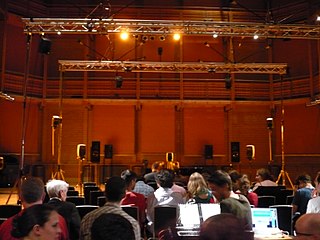Related Research Articles
Electroacoustic music is a genre of popular and Western art music in which composers use technology to manipulate the timbres of acoustic sounds, sometimes by using audio signal processing, such as reverb or harmonizing, on acoustical instruments. It originated around the middle of the 20th century, following the incorporation of electric sound production into compositional practice. The initial developments in electroacoustic music composition to fixed media during the 20th century are associated with the activities of the Groupe de recherches musicales at the ORTF in Paris, the home of musique concrète, the Studio for Electronic Music in Cologne, where the focus was on the composition of elektronische Musik, and the Columbia-Princeton Electronic Music Center in New York City, where tape music, electronic music, and computer music were all explored. Practical electronic music instruments began to appear in the early 20th century.
Mario Davidovsky was an Argentine-American composer. Born in Argentina, he emigrated in 1960 to the United States, where he lived for the remainder of his life. He is best known for his series of compositions called Synchronisms, which in live performance incorporate both acoustic instruments and electroacoustic sounds played from a tape.
Horacio Vaggione is an Argentinian composer of electro-acoustic and instrumental music who specializes in micromontage, granular synthesis, and microsound and whose pieces are often scored for performers and computers.
The Society for Electro-Acoustic Music in the United States (SEAMUS) is a nonprofit US-based organization founded in 1984 that aims to promote the performance and creation of electro-acoustic music in the United States. In particular, the organization aims:
Founded in 1986, La Communauté électroacoustique canadienne / The Canadian Electroacoustic Community (CEC) is Canada's national electroacoustic / computer music / sonic arts organization and is dedicated to promoting this progressive art form in its broadest definition: from "pure" acousmatic and computer music to soundscape and sonic art to hardware hacking and beyond.
Hans Tutschku is a German composer.
Maggi Payne is an American composer, flutist, video artist, recording engineer/editor, and historical remastering engineer who creates electroacoustic, instrumental, vocal works, and works involving visuals.

Zbigniew Karkowski was a Polish experimental musician and composer.

John Palmer (1959) is a British composer, pianist and musicologist.
Jonty Harrison is an electroacoustic music composer born 27 April 1952 in Scunthorpe, UK, and currently living in Birmingham, UK.

Birmingham ElectroAcoustic Sound Theatre, or as it is more commonly known, BEAST, is a sound diffusion system specifically designed for the performance of electroacoustic music. It is a long-running project of the Electroacoustic Music Studios at the University of Birmingham, founded in 1982 under the directorship of Jonty Harrison. Since 2014 BEAST has been directed by Scott Wilson, along with Annie Mahtani and James Carpenter as technical director. Simply put, it consists of a set of loudspeakers connected to a computer, usually controlled by a diffusion console.
Scott Wilson is a Canadian composer. He studied music and composition in Canada, the U.S., and Germany, and his teachers include Barry Truax, Wolfgang Rihm, Christos Hatzis, Gary Kulesha, Ron Kuivila, Alvin Lucier, Owen Underhill, Neely Bruce and David Gordon Duke. Since 2004 he has lived in Birmingham, UK, where he is Reader in Electronic Music and Director of Birmingham ElectroAcoustic Sound Theatre and the Electroacoustic Studios at the University of Birmingham.
Live electronic music is a form of music that can include traditional electronic sound-generating devices, modified electric musical instruments, hacked sound generating technologies, and computers. Initially the practice developed in reaction to sound-based composition for fixed media such as musique concrète, electronic music and early computer music. Musical improvisation often plays a large role in the performance of this music. The timbres of various sounds may be transformed extensively using devices such as amplifiers, filters, ring modulators and other forms of circuitry. Real-time generation and manipulation of audio using live coding is now commonplace.
Leigh Landy is a composer and musicologist of Dutch and American citizenship. He holds a Research Chair at De Montfort University where he directs the Music, Technology and Innovation Research Centre.
Judy Klein is an American composer, music educator. She is the founder of the Computer Music Studio at New York University and served as its director in 1980's. Her music is primarily acousmatic, and includes works for the electronic medium, sound installations, music for theatre and collaborations with visual artists.
Kurt Stallmann is an American composer who lives and works in Houston, Texas.
The Experimental Music Studios (EMS) is an organization or center for electroacoustic and computer music, focusing on synthesis and concert performance of art music, founded by Lejaren Hiller at University of Illinois at Urbana-Champaign in 1958.
Scott L. Miller is an American composer best known for his electroacoustic chamber music and ecosystemic performance pieces.
The International Confederation of Electroacoustic Music (ICEM), or Bourges International Confederation of Electroacoustic Music, formerly Groupe de musique expérimentale de Bourges, is a music organization in support of electroacoustic music, including computer music.
Lothar Voigtländer is a German composer.
References
- 1 2 3 4 5 6 7 "Scott A. Wyatt". ems.music.illinois.edu. Retrieved 2017-12-12.
- 1 2 3 4 5 6 7 8 9 10 "Interview with Scott Wyatt | SEAMUS". www.seamusonline.org. Retrieved 2017-12-12.
- 1 2 3 4 5 "Scott Wyatt | Music at Illinois". music.illinois.edu. Retrieved 2017-12-13.
- 1 2 "Scott Wyatt named 2018 SEAMUS Award Winner | SEAMUS". seamusonline.org. Retrieved 2017-12-13.
- ↑ "CEC — eContact! 1.2 — Gestural Composition by Scott A. Wyatt". CEC | Canadian Electroacoustic Community. Retrieved 2017-12-13.
- ↑ "CEC — eContact! 2.4 — Investigative Studies on Sound Diffusion/Projection by Scott A. Wyatt". CEC | Canadian Electroacoustic Community. Retrieved 2017-12-13.
- 1 2 "Urbana-Champaign Local Music Oral History with Scott Wyatt About the University's Experimental Music Studio". Sousa Archives and Center for American Music. 2017-01-03. Retrieved 2017-12-13.